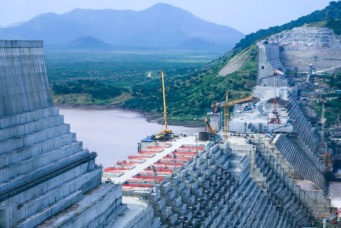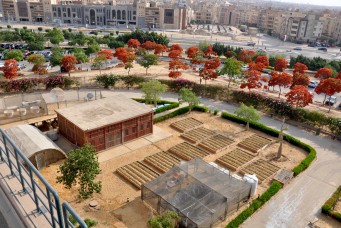Summers of Strife: From Libya to Ethiopia
Ethiopia’s obstinance puts the region at a sensitive crossroads again

At this time last year, I wrote that Libya may become an arena for regional conflict if Turkey continued its military intervention there. But after Egyptian President Abdel Fattah al-Sisi drew a red line warning Turkey to back off, the potential for regional escalation declined and diplomatic and political efforts were quickly revived .Conflict exhausted domestic constituencies and others weary of expanded regional conflicts accepted a United Nations roadmap focused on building effective institutions for a new Libyan state. These are a positive and welcome developments, even if it’s too early to rest assured and presume a desirable outcome to the Libyan crisis is easily within grasp.
This year we find ourselves again looking at the summer season with concern and anxiety given the escalating tensions in East Africa surrounding the Grand Ethiopian Renaissance Dam (GERD). The tone of political rhetoric between the Egyptian, Sudanese, and Ethiopian leaderships has become strenuous. With the imminent summer rains, Addis Ababa remains stubborn in its determination to begin the second-stage filling of the dam reservoir without a binding legal agreement between the three riparian countries regarding matters of water administration and the reservoir filling schedule.
Egyptian President Sisi has repeatedly warned about the “careless misuse” of river waters by some states and reiterated that Egypt’s water rights are inviolable and “cannot be touched”. He cautioned those who may doubt her resolve in defending its water rights are making an egregious mistake. Sudanese warnings adopt the same tone, promising that “all options” to protect Sudan’s security will be considered. This rhetoric follows Ethiopia’s recalcitrant position in talks about the mega-dam and its determination to commence the second-stage, much-larger filling of dam reservoir this summer without regard to the extent of progress in negotiations. Addis Abba has also emphasized Ethiopia’s capacity to protect itself from any danger or threat.
All signs indicate that Ethiopia’s stalling and intransigence has been a long-standing rule. It had declined to cooperate with the International Panel of Experts, whose 2013 report documented numerous concerns about the dam’s transboundary impact. In 2015—even after the three Nile Basin states signed the “Declaration of Principles” in Sudan—Ethiopia continued to stall and delay attempts to reach a binding agreement. It has persisted in saying that any agreement would be a guidance document that reserves Ethiopia’s discretion to make independent and unilateral decisions about the dam, its operation, and the flow rate under a variety of climatological conditions, whether rains, floods, or multi-year drought. It has continued to drag its feet at the latest meetings in Congo, offering only perfunctory schemes to notify downstream parties of the measures it has unilaterally adopted.
A Crossroads
We now shortly arrive at a highly sensitive juncture where existing alternatives and options do not inspire confidence. It is clear that the current tripartite talks under the auspices of the African Union will not lead to a desired outcome. Space for negotiations and time for political maneuvers no longer exist, as the scheduled filling of the reservoir rapidly approaches. Even were abundant rains to marginally reduce the damage inflicted on Egypt and Sudan, the danger of this next stage is that it prolongs the status quo and implicitly sets a precedent that sensitive decisions about the dam are for Ethiopia unilaterally without consulting the other two parties.
Dialogue is always a more preferable route to resolving conflict provided political will exists. Even if negotiations stall and the situation deteriorates, it is always better to work within the framework of the practical negotiating process. However, the gravity of the current situation reflects Ethiopia’s attempts to impose a principle of unilateral decision-making that flouts any meaningful, potential accord. Despite Emirati endeavors to mediate the dispute and Saudi Arabia’s stated intention to host a summit for the three parties, I do not believe there’s a clear path forward while Ethiopia continues to act as a unilateral decision-maker. Rather, moving negotiations from the auspices of the African Union to that of the Saudi kingdom or in other forums may open the door for more posturing and stall tactics from Addis Abba.
Egypt and Sudan have the right to resort to a variety of international institutions such as the UN and African Union to gather broad-based support for their position. This is a right and obligation for the two states. However, I do not believe that Ethiopia will respond to calls and resolutions of an international nature particularly that the prevailing discord in the international community does not augur well for reliable enforced compliance.
Would Russian or American mediation be useful?
One wonders if Russian and/or American intervention presents an exit from the dilemma, in light of Russian Foreign Minister Sergei Lavrov’s visit to Egypt this past April and the new American administration sending Senator Chris Coons, a visiting delegate in Sudan, to Egypt a few weeks ago followed this week by Jeffrey Feltman the special envoy to the Horn of Africa , I certainly hope these developments inject new political will into resolving the issue. But I am not optimistic. For one, Russia’s cards to pressure Ethiopia are few, and the statements from the U.S. Department of State appear to lean toward Ethiopia in their support for a proposed, voluntary exchange of information about the dam reservoir. Such proposals enshrine a principle of unilateral decision-making.
For all these reasons, I fear that we have arrived at a perilous juncture, where all options are difficult, and delays on the diplomatic front leave us with an untenable status quo. The potential for collision carries with it great regional and international repercussions. In a tough situation, tough decisions are made. A strong state is one that has the wisdom to resolve conflict through peaceful means and dialogue, considering all potentialities and implications. Strong states are also however those which make decisive, timely decisions when necessary and those which are able to translate the forceful decisions made under difficult circumstances into concrete results.
So, will this summer witness a destabilizing escalation for which all will pay a high price? Or will a miraculous breakthrough save us from needless risks—surprising us with a burst of political will at the last moment? Suffice to say, summer 2021 will leave an indelible mark on the interests of the three Nile Basin states and on the future of East Africa.
Nabil Fahmy is a former foreign minister of Egypt. He is also Dean Emeritus and Founding Dean of the School of Global Affairs and Public Policy at the American University in Cairo. He served as Egypt’s ambassador to the United States from 1999 to 2008, and as envoy to Japan between 1997 and 1999. On Twitter: @DeanNabilFahmy.
Read More



